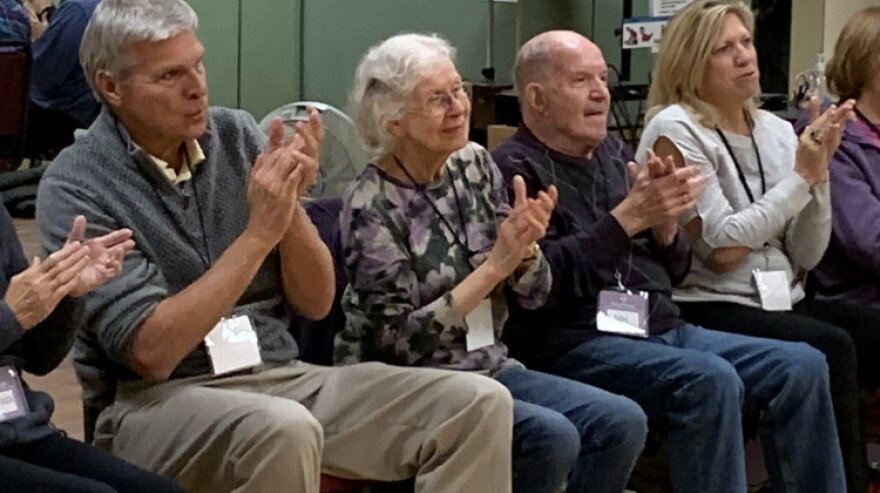Across the United States, Alzheimer's is a growing problem. The number of people with the disease is expected to increase nearly 15 percent over the next eight years. There’s no cure, but some caregivers are using music to help.
On a recent Friday, the first rehearsal for the Song Shape chorus was held in an Indianapolis suburb. It’s made up of 28 patients with early- to mid-stages of dementia and their caregivers.
Lauren O’Neil and her mother Tina Bivona are part of the group. They say music has always been a part of their lives.
"It was something to do, you know," says Bivona.
O'Neil reminds her mother that she also played accordion.
"Oh yeah, that's right," says Bivona, "I forgot. My god, for years."
Rick Cobb directs the choir. He says when it comes to memory, music holds a special place. Some research shows patients with dementia can even learn new music.
"They may be losing language and comprehension on the left side of the brain. On the right side of the brain, they still retain the ability to sing and to do rhythm and poetry," says Cobb.
There’s no proven treatment for Alzheimer’s and dementia, and therapy options are limited.
Tim Brimmer, professor of music education at Butler University, has been studying the effects of music for people with these conditions.
"We believe that music is a prescription music can prescriptively, proactively reduce or prevent many of the terrible things that happen when we age," says Brimmer.
He led a state-funded research project that showed personalized playlists for dementia patients helped reduce symptoms including agitation and confusion.
He says researchers are learning more about how music helps produce positive brain chemicals like endorphins. His current work is focused on how adding movement could help older Hoosiers.
"Imagine that if a person is singing while they're moving while they're hearing while they're with other people socializing," says Brimmer. "It is this bombardment of bio-cycles, social stimulation."
As the Song Shape chorus nears the end of its rehearsal schedule.
Rick Cobb, the choir director, says the process has been awesome.
"For that mom that's suffering with this disease and the daughter who's brought her mom to rehearsal to be able to connect," says Cobb.
Lauren O’Neil considers herself lucky, the mom she knows is still very present.
She reminds her mother, Tina Bivona, of another connection to music.
"My parents owned a jazz club on the Jersey Shore," says O'Neil. "There was a lot of jazz playing in the house and my dad really liked opera."
Research suggests that for dementia patients, the music from their youth will have the strongest therapeutic value. Participating in the Song Shape choir has provided that for Tina.
"I just couldn't believe it," says Bivona. "When Lauren brought me here I'm thinking I'm not gonna know anybody. And then I know all that what's going on with the songs."
She’s able to remember the tune, the words, songs that had connections to her mother.
O’Neil says that as a caregiver the experience has given her more hope.
"It's nice to know that they'll be resources for people who suffer from dementia and their caregivers," says O'Neil.





